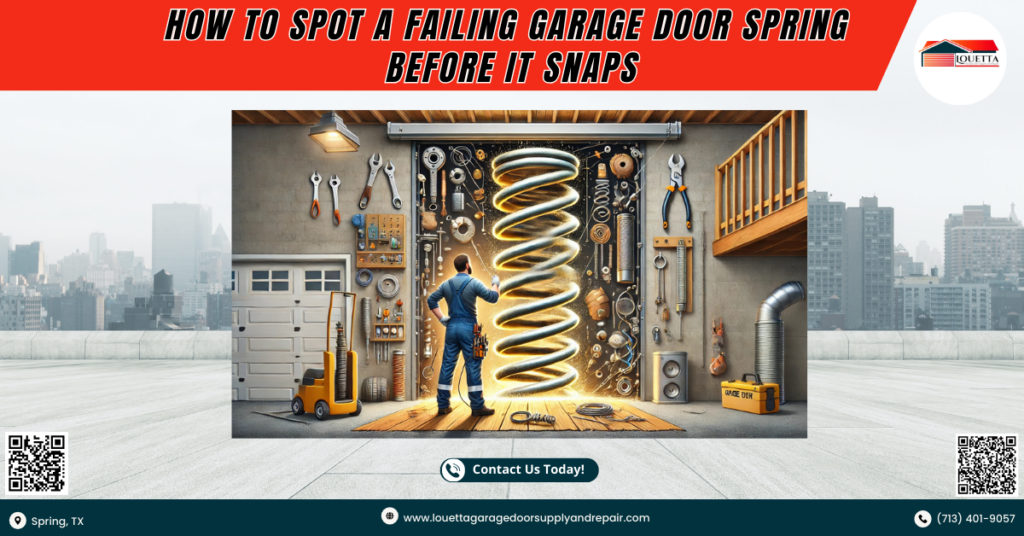Spot garage door spring failure early and avoid costly breakdowns. Call Louetta Garage Door Supply and Repair in Spring, TX today for expert service.

A failing garage door spring is more than just an inconvenience—it can lead to costly repairs, safety risks, and even being stuck without access to your vehicle. Knowing the early warning signs can save you time and money, and that’s exactly what we’re going to cover today.
Why Do Garage Door Springs Fail?
Garage door springs are under immense tension, lifting heavy doors multiple times a day. Over time, they wear out due to regular use, rust, and improper maintenance. Factors like extreme weather conditions, lack of lubrication, and incorrect spring tension can accelerate their failure. If left unchecked, a broken spring can leave you in need of emergency garage door repair, which can be costly and inconvenient.
Common Causes of Garage Door Spring Failure
Understanding the root causes of spring failure can help you take proactive steps to maintain your garage door. Some of the most common reasons include:
- Wear and Tear: Springs have a limited lifespan, usually measured in cycles. Each cycle represents one full opening and closing of the garage door.
- Rust Formation: Moisture buildup can cause rust, which weakens the springs and leads to faster deterioration.
- Improper Maintenance: Failing to lubricate or inspect your springs regularly can cause them to wear out prematurely.
- Incorrect Spring Type: Using the wrong type or size of spring for your door can lead to excessive stress and early failure.
Signs Your Garage Door Spring Is About to Fail
Recognizing the signs of a weakening spring early can help you avoid a full-on failure. Look out for these red flags:
1. Unusual Noises
If your garage door suddenly starts making loud creaking or popping noises, it could be a sign that the springs are straining under pressure. These sounds indicate that the metal is weakening and may snap soon. A sudden loud bang from the garage can also indicate a broken spring.
2. Uneven Opening and Closing
When the garage door opens or closes unevenly, it might mean one of the springs is wearing out faster than the other. This imbalance can place extra strain on your garage door opener, leading to the need for garage door opener repair. You may also notice one side of the door appearing lower than the other when it’s partially open.
3. Gaps in the Spring
A healthy garage door spring should be tightly coiled. If you notice gaps or spaces between the coils, it’s a clear sign the spring is losing tension and might break soon. This issue usually arises due to metal fatigue over time.
4. Garage Door Feels Heavier Than Usual
If you suddenly struggle to manually lift your garage door, it could mean the spring is no longer doing its job effectively. This is a critical sign that garage door spring repair is needed. A functioning spring should counterbalance the weight of the door, making it feel relatively light.
5. Slow Response Time
Does your garage door take longer than usual to open or close? A worn-out spring may struggle to operate smoothly, leading to delays. This can also indicate that the motor is compensating for a failing spring, which can lead to motor burnout.
6. Sudden Jerky Movements
If your garage door moves in a jerky fashion instead of a smooth glide, it could indicate that spring is on its last legs. The door might also stop mid-operation due to uneven tension distribution.
How to Prevent Costly Repairs
The good news is that early detection can prevent a complete breakdown. Here are some preventative measures:
- Regular Inspections: Check your springs every few months for signs of wear. Look for any visible rust, cracks, or deformation.
- Lubrication: Use a high-quality garage door lubricant to reduce friction and prevent rust formation.
- Balanced Operation: If your garage door isn’t moving evenly, call for professional residential garage door repair to adjust the tension.
- Professional Tune-ups: Schedule periodic maintenance with Louetta Garage Door Supply and Repair in Spring, TX, to ensure all components are working properly.
- Avoid DIY Repairs: Garage door springs are under high tension and should only be handled by experienced professionals.
FAQs About Garage Door Springs
Q: How long do garage door springs typically last?
A: Most springs last between 7-10 years, depending on usage and maintenance. Frequent use and lack of maintenance can shorten their lifespan.
Q: Can I replace garage door springs myself?
A: Due to the high tension, it’s best to leave spring replacement to professionals to avoid injury. Attempting DIY repairs can result in serious accidents.
Q: What should I do if my garage door spring breaks?
A: Stop using the door immediately and contact an emergency garage door repair service to avoid further damage to your door and opener.
Q: What’s the difference between torsion and extension springs?
A: Torsion springs are mounted above the door and provide a smoother operation, while extension springs are located on the sides and stretch to provide lift.
Don’t Wait—Act Now!
If you’ve noticed any of these warning signs, don’t wait until your garage door stops working altogether. Louetta Garage Door Supply and Repair offers expert garage door replacement, garage door repair in Spring, TX, garage door installation, and emergency garage door repair services.
We proudly serve Spring, TX, including notable areas like Old Town Spring, Pundt Park, and the Mercer Botanic Gardens. Whether it’s residential garage door repair or commercial garage door repair, we’re here to help.
Contact us today for a free inspection and keep your garage door running smoothly!